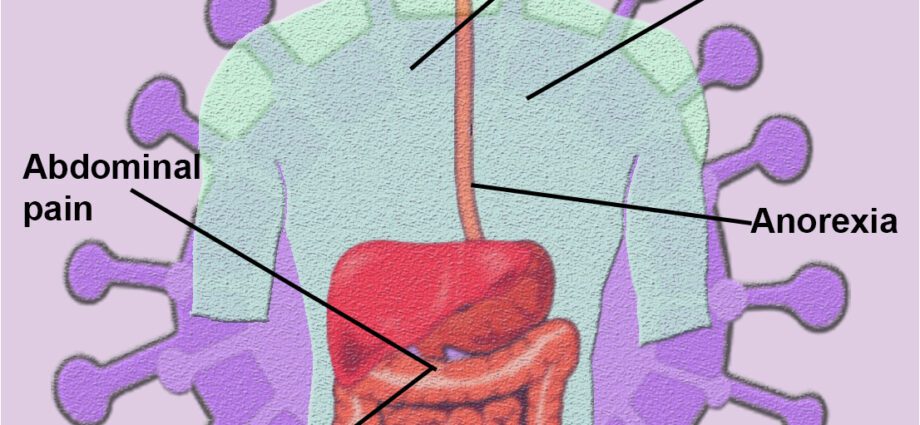Covid-19 și gastroenterită: care sunt diferențele?
Colds, flu, gastroenteritis… The symptoms of the new coronavirus resemble those of certain frequent and benign pathologies. Covid-19 disease can cause diarrhea, upset stomach or even vomiting. How to differentiate gastro from coronavirus? Is gastrointestinal illness a manifestation of Covid-19 in children?
Echipa PasseportSanté lucrează pentru a vă oferi informații fiabile și actualizate despre coronavirus. Pentru a afla mai multe, găsiți:
|
Covid-19 and Gastroenteritis, avoid confusing the symptoms
Simptomele gastroenteritei
Gastroenteritis is, by definition, an inflammation of the lining of the digestive tract, causing diarrhea or stomach cramps. Usually it begins with the sudden onset of acute diarrhea. In terms of clinical signs, an increase in the frequency of stools over a 24-hour period and a modified consistency are witnesses to this pathology. Indeed, the stools become soft, even watery. In some cases, gastroenteritis is accompanied by fever, nausea, vomiting, or abdominal pain. More rarely, traces of blood are present in the stool.
The evils of the new coronavirus are now well known to the general public. The first and most common signs are like those of a cold: runny nose and stuffy nose, dry cough, fever and fatigue. Less frequently, the symptoms of Covid-19 are similar to those of the flu (add link when MEL article), that is, body aches, sore throat and headache (headache). Some patients also present with conjunctivitis, loss of taste and smell, and skin changes (frostbite and hives). Serious signs, which should alert and lead to a call to SAMU on 15, are dyspnea (difficulty in breathing or unusual shortness of breath), a feeling of tightness or pain in the chest and loss of speech or motor skills. At last, some studies have linked symptoms of gastroenteritis to disease related to the novel coronavirus. How to make the difference ?
perioadă de incubație
The incubation period, that is to say the time that elapses between contamination and the appearance of the first symptoms, is different for the two pathologies. It is 24 to 72 hours for gastroenteritis while it is between 1 to 14 days for Covid-19, with an average of 5 days. In addition, gastroenteritis manifests itself suddenly, while for the new coronavirus, it is rather progressive.
Contagiousness and transmission
Gastroenteritis, if linked to a virus, is highly contagious, as is Covid-19 disease. The common point is that these diseases are transmitted by direct contact between a sick person and a healthy person. Transmission can also take place through soiled surfaces touched by the contaminated individual, such as door handles, elevator buttons or other objects. The Sars-Cov-2 virus is spread through the air, through secretions emitted when coughing, sneezing, or when a person speaks. This is not the case with gastroenteritis.
Complicațiile
In the case of Covid-19 disease, the risk of complications is mainly respiratory. Patients who develop a severe form of the pathology sometimes resort to oxygen therapy, or even restoration of vital functions. Sequelae after short and long-term resuscitation are also observed, such as disabling fatigue, cardiac or neurological disorders. Respiratory and speech therapy rehabilitation is sometimes necessary. This is the press release from the HAS (Haute Autorité de Santé), which informs us: “COVID-19 is known to cause sometimes severe respiratory damage, but also other impairments: neurological, neurocognitive, cardiovascular, digestive, hepatorenal, metabolic, psychiatric, etc.".
With regard to gastroenteritis, the highest risk of complication is dehydration, especially in younger and older patients. Indeed, the body loses a lot of water and mineral salts. It is therefore important to eat and hydrate properly. It can also be accompanied by a little fever. However, patients recover completely from the gastro in about 3 days with no recurrence.
Covid-19 and gastroenteritis: what about children?
Regarding children affected by the new coronavirus, it seems that the virus has been found in their feces, for nearly 80% of them. Researchers do not yet know whether the virus is infectious or not. However, infected children are more likely than adults to experience symptoms similar to those of gastro, in particular diarrhea. They would usually be more tired than usual and experience loss of appetite.
If the child feels the symptoms of gastroenteritis, in the absence of characteristic signs of Covid-19 (cough, fever, headache, etc.), the risks of having contracted the new coronavirus are low. If in doubt, it is advisable to call the doctor.
Tratament
The treatment of Covid-19 is symptomatic, for the mild forms. Several studies are underway to find a cure as well as global research for a vaccine. When it comes to gastroenteritis, care must be taken to stay well hydrated and choose the right foods. If needed, treatment can be prescribed by the doctor and a vaccine is available each year.










